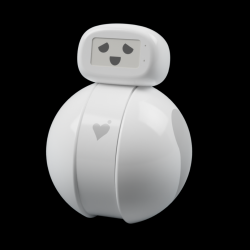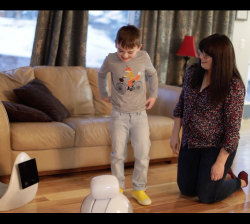Robots: A New Method of Learning
PROVO, Utah – Jun 07, 2018 – Imagine you're a child waking up every morning afraid and upset because you are unable to communicate your needs. Or envision being a parent, breaking into tears, trying everything you can to pacify your child and get them to ask you a question. For children on the autism spectrum and for their parents, this can often be reality.
Early Intervention Robotics, or EI Robotics, is a company started by BYU students seeking to make a difference for children with autism spectrum disorder (ASD) and their families by creating an interactive robot to help children learn foundational skills.
Jared Workman, a computer science major and entrepreneurship minor, founded the project, which is funded by the Ballard Center for Economic Self-Reliance’s Social Venture Academy. His idea began as a way to help children with all intellectual disabilities, but as he started reaching out to parents, he soon realized that the strongest need for help came from the parents of children with ASD. His journey to build an interactive and educational robot—named Nelli—began.
“I’ve grown to appreciate the things that most of us take for granted, like being able to talk to other people, being able to make friends, and being able to read and write,” Workman says. “These are foundational skills that most of us don’t even think about. But for these kids, these things are a big deal.”
Last August, Workman approached his friend Grant Hagen, an electrical engineering major, who was working on his own robotics projects. Eight prototypes later, Nelli is up and running, and the alpha version is scheduled to launch in June when the first twenty robots will go out into homes to interact with children.
Aaron Cheung, a 2018 computer science graduate, has been working on Nelli’s programming. He says it’s been quite a journey to get Nelli to where it is now.
“I remember at one point we wanted to get something–anything–out there into homes as an example of what this would look like, so we literally stuck a Styrofoam ball on a remote control car and brought it out,” Cheung says. “But we’ve learned a lot and have been designing and moving forward since then.”
When they were about halfway through their process of building Nelli, the team heard that the Social Venture Academy was offering support for projects with social impact. They brought EI Robotics to the academy and were able to receive funding and critique.
“The Ballard Center has been hugely helpful in making sure we’re not just making money, but actually making a difference,” Workman says.
Nelli functions through an app on a phone inside its head. The app pairs Nelli with an iPad, which a child can use to control the robot. The child alternates between working with their parents on the iPad and playing interactive games with Nelli, targeting a specific skill. Eventually, as the child progresses, the robot won’t be necessary when it comes to that particular skill, and the child will be able to apply what they’ve learned in real-life settings.
Nelli is intended to help children recognize and respond to emotions, learn to communicate, build interdependent relationships and social skills, and collect data on their progress to provide to parents and therapists.
While Workman, Hagan, and Cheung have been working on the development and technology behind Nelli, Kaylee Christensen, a graduate student in the special education program, has been hard at work on the therapeutic curriculum that Nelli will employ.
Christensen says applied behavioral analysis, or ABA, is currently the leading autism therapy, but it is expensive and there is a shortage of therapists across the nation. Because of this, many families struggle to provide their children with the best possible care. Christensen has been working on applying ABA into Nelli’s programming as a more affordable and interactive alternative.
Each team member expects that EI Robotics will expand to be a nationwide company and hopes that Nelli will eventually be in every home of children with ASD. Hagen says the current product is tailored specifically to the challenges that children with autism face, but with a little coding and modification, Nelli can be adapted to help children with all different kinds of struggles.
“Based on our research and studies, we believe we’ve built something that children will want to engage with and that will increase growth,” Workman says. “Honestly, if we could help one kid to be able to make friends and communicate with his parents, that would be amazing. But we plan to help much more than one kid.”
Media Contact: Jordan Christiansen (801) 422-8938
Writer: Katelyn Stiles





